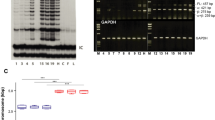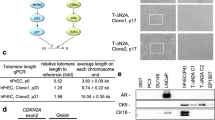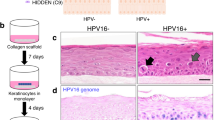Abstract
Human keratinocyte immortality is genetically recessive to the normal phenotype of limited replicative lifespan and appears to require the dysfunction of p53 and the cyclin D-Cdk inhibitor p16. In order to test for the inactivation of other candidate replicative lifespan genes in the immortal cells of human tumors, we developed a series of mortal and immortal keratinocyte cultures derived from neoplastic lesions of the head and neck which were amenable to molecular genetic analysis by the loss of heterozygosity (LOH) technique. The results indicate that keratinocyte immortalization in head and neck squamous cell carcinoma (SCC-HN) development involves the inactivation of at least two further pathways to senescence and four in all. Chromosomes 1, 4 and 7 carry genes representing immortality complementation groups C, B and D respectively and immortal keratinocytes showed LOH at either 4q32-q34 between D4S1554 and D4S171 (group B) or 7q31 (group D) but never 1q25 (group C). These results tentatively suggest that the genes responsible for the immortality complementation groups encode proteins on the same pathway to senescence. In addition, all of the immortal keratinocyte lines possessed high levels of telomerase activity and a suppressor of telomerase activity has been mapped to the short arm of chromosome 3p. Five out of eight lines showed LOH at 3p21.2-p21.3, a region which may carry a gene capable of suppressing SCC-HN telomerase. However, alternative mechanisms of telomerase reactivation were also suggested by our results. None of the above genetic alterations were seen in seven senescent neoplastic keratinocyte cultures. Other loci harbouring antiproliferative genes implicated in replicative lifespan showed few or no alterations and any alterations seen were additional to those described above.
This is a preview of subscription content, access via your institution
Access options
Subscribe to this journal
Receive 50 print issues and online access
$259.00 per year
only $5.18 per issue
Buy this article
- Purchase on Springer Link
- Instant access to full article PDF
Prices may be subject to local taxes which are calculated during checkout
Similar content being viewed by others
Author information
Authors and Affiliations
Rights and permissions
About this article
Cite this article
Loughran, O., Clark, L., Bond, J. et al. Evidence for the inactivation of multiple replicative lifespan genes in immortal human squamous cell carcinoma keratinocytes. Oncogene 14, 1955–1964 (1997). https://doi.org/10.1038/sj.onc.1201028
Received:
Revised:
Accepted:
Issue Date:
DOI: https://doi.org/10.1038/sj.onc.1201028
Keywords
This article is cited by
-
Senescent cancer-associated fibroblasts secrete active MMP-2 that promotes keratinocyte dis-cohesion and invasion
British Journal of Cancer (2014)
-
NOTCH1 Mutations Occur Early during Cutaneous Squamous Cell Carcinogenesis
Journal of Investigative Dermatology (2014)
-
Identification of homozygous deletions of tumor suppressor gene FAT in oral cancer using CGH-array
Oncogene (2007)
-
Profiling early head and neck cancer
Nature Reviews Cancer (2005)
-
Human squamous cell carcinomas lose a mortality gene from chromosome 6q14.3 to q15
Oncogene (2003)



